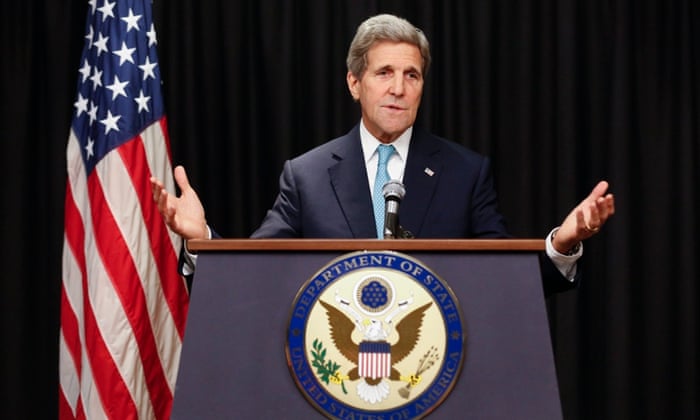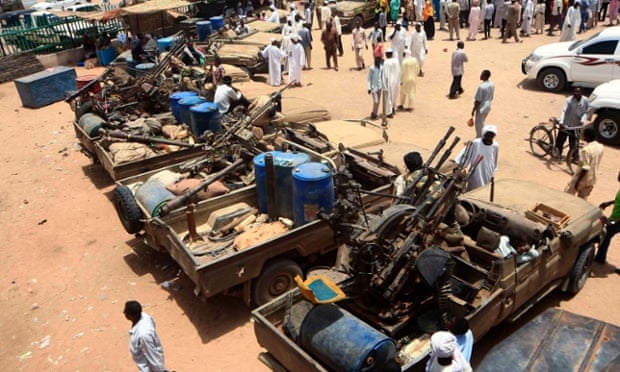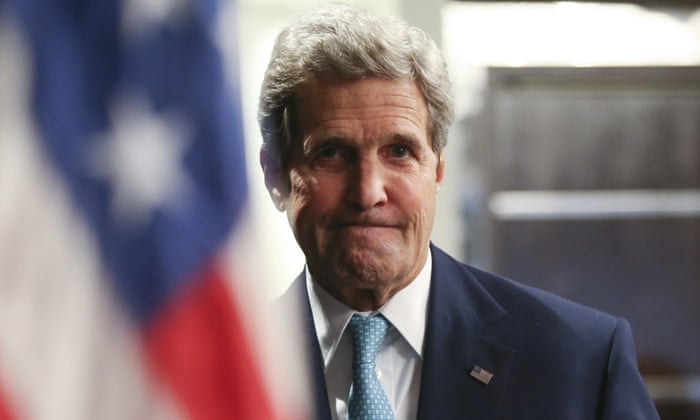South Sudan’s promising future is “at grave risk of being squandered” because its leaders have failed to reach a lasting peace deal to end a bloody civil war more than a year after negotiations began, US secretary of state John Kerry has warned.
Millions of lives are at risk of escalating violence and food shortages after fresh clashes between forces loyal to president Salva Kiir and those aligned to his former vice-president Riek Machar broke out last month in the country’s Upper Nile and Unity states. The International Crisis Group said the recent fighting, which has displaced more than 14,000 civilians, is the most serious violence the country has seen since August last year.
South Sudan descended into civil war in December 2013, after Kiir accused Machar of plotting a coup. The war has caused the deaths of tens of thousands of civilians and displaced more than 1.5 million people within the country. About 520,000 people have fled to neighbouring countries.
“With each day, the ranks of the hungry and the malnourished grow,” Kerry said on Monday during an official visit to Kenya. “And none of this had to happen, but it did happen because the country’s leaders failed to act on behalf of the best interests of their people and their nation.”
Kerry said the US would give $5m (£3.3m) towards a justice mechanism to hold perpetrators of South Sudan’s violence to account, and urged other international donors to contribute.
April’s bloodshed caused food security levels to slide in Upper Nile, Jonglei, Unity, Warrap, and Lakes states, according to the UN’s Office for the Coordination of Humanitarian Affairs (Ocha). The conflict is wreaking havoc on South Sudanese livelihoods as people can’t move freely around the country and are prevented from trading, planting crops and taking care of their livestock.
Diplomats and aid agencies have urged warring factions to “urgently” form a binding peace deal to prevent further violence and avoid a looming food crisis. About 3.5 million people – nearly 40% of South Sudan’s population – will require emergency food assistance by June, according to the famine early warning systems network (Fews Net).
Several ceasefires have failed to end the country’s conflict, provoking frustration from the US, which in February presented a UN draft resolution threatening a global travel ban and assets freeze.
In a UN report leaked to Reuters, UN secretary general Ban Ki-moon said South Sudan’s leaders have “failed to see beyond their personal ambitions”, and threatened the imposition of sanctions on both sides.
The Intergovernmental Authority on Development (Igad), which is leading peace talks in the Ethiopian capital, Addis Ababa, said that “90% of differences” between the warring factions have been solved, but serious disputes remain. In response to the deadlock, Igad has announced a “different and innovative approach” to solving the conflict that will bring in Britain, China and the US, as well as other African mediators.
Christos Stylianides, the EU’s commissioner for humanitarian aid and crisis management, said: “Having just returned from South Sudan, I am more concerned than ever about the deadlock of the peace talks and the intensification of fighting. These have terrible humanitarian consequences.”
A “substantial reduction” in violence would immediately improve humanitarian access and allow aid agencies to distribute food supplies, Ocha said.
But aid agencies remain sceptical that a peace deal will be formed in the coming weeks and warn of serious humanitarian consequences if fighting continues. “We are quite concerned that the security situation will deteriorate,” said Juan Prieto, Médecins Sans Frontières (MSF) head of mission in South Sudan. “The rainy season is coming and that’s a very worrisome factor for us, especially because of [the prospect of] cholera.”
Heavy rains are expected to hit the country in June, making it difficult to traverse road networks and deliver food supplies.
The number of South Sudanese people requiring humanitarian assistance has increased by about 500,000 over the past year, but aid agencies say they are finding it harder to reach communities in areas hit by violence.
The UN’s World Food Programme (WFP) said it had suspended humanitarian services in Akoka and Fashoda counties in Upper Nile State following the disappearance of three WFP staff members and their vehicles while transporting food supplies from Malakal to Melut on 1 April. At least 10 aid workers have been killed or abducted in Upper Nile State since the conflict began.
In the past, clinics and hospitals across the country have been looted and destroyed during the fighting. But combatants have not attacked MSF’s medical facilities over the past few months, Prieto said.
Stylianides said: “Humanitarian aid saves lives but it cannot solve the crisis. A sustainable peace agreement is urgently needed.”
**************************************************************
John Kerry visits Somalia amid tight security
Somali government was notified only a day in advance of visit, the first by a US secretary of state
John Kerry, the US secretary of state, has made an unannounced and unprecedented trip to Somalia in a show of solidarity with a government trying to defeat al-Qaida-allied militants and end decades of war.
Kerry, who is the first top US diplomat to visit Somalia, arrived at Mogadishu’s airport shortly before noon local time and was greeted on the tarmac by Somalia’s president and prime minister. He held a series of meetings that included both of them along with regional leaders and civil society groups, before flying to Kenya a little more than three hours later.
“More than 20 years ago, the United States was forced to pull back from your country,” Kerry said in a video address to the Somali people, invoking the Black Hawk Down debacle when Somali militiamen shot down two US helicopters. “Now we are returning in collaboration with the international community and bearing high hopes but also mixed with ongoing concerns.”
The trip was made under tight security. Somalia’s government found out only a day ago that Kerry would join the State Department’s top Africa official, Linda Greenfield-Thomas, on the visit. And the fact that Kerry was not venturing beyond the airport highlighted just how dangerous and unstable the country remains.
“The next time I come, we have to be able to just walk downtown,” Kerry told the Somali president, Hassan Sheikh Mohamud. The president replied that downtown “is very different now”.
Top of the agenda is the fight against al-Shabaab. African forces and US drone strikes have crippled the organisation’s leadership in recent years and left the extremists without much of the territory it once controlled or the cashflows needed to reverse its losses.
But as al-Shabab has decentralised, the militants in some ways have become even more dangerous, expanding their activities in Kenya and other neighbouring countries. Last month’s massacre at Kenya’s Garissa University College killed 148 people, mostly students, and underlined the group’s capacity to carry out relatively unsophisticated but extremely deadly attacks far from its bases of operations.
Somalia has been without a truly functioning nationwide government for two and a half decades. After warlords ousted the dictator Siad Barre from power in 1991, they quickly turned on one another. Militias, Islamist extremist groups and Somalia’s nominally national military all vied for power before the tide turned against al-Shabaab this decade. Piracy has been another problem.
“Over the past quarter century, you have known immense suffering from violence, from criminals, from sectarian strife, from dire shortages of food, and from an inability to remain safely even within your villages and homes,” Kerry said in his address.
“I visited Somalia today because your country is turning around,” he said. “Three years have passed since a new provisional constitution was adopted and a parliament sworn in. With help from [African troops], Somali forces have pushed al-Shabaab out of major population centres. A determined international effort has put virtually all of Somalia’s pirates out of business.”
Yet even as a relative calm has settled over parts of the country, including Mogadishu, Somalia brings back painful memories for the US.
American troops were sent there in 1992 on a peacekeeping mission to help stave off a national famine. They left two years later in humiliation after 18 servicemen were killed in the downing of US helicopters and a subsequent rescue attempt .
The Obama administration is banking on Mohamud’s government to turn a new page toward democracy and economic development. The US has provided hundreds of millions in military support to build up and professionalise the army, and is working with Mohamud to try to usher in a broader, more representative government over the next 18 months.
If that effort is successful and the country becomes more stable, officials say the US could re-establish an embassy in the capital before Barack Obama leaves office. For now, the US president has nominated a career diplomat, Katherine Dhanani, to serve as America’s first ambassador to Somalia since 1991, with the idea that she would be based in Nairobi and make regular trips into Somalia. Britain, Italy and several other countries already have embassies in Mogadishu.
On Monday, Kerry held extensive talks with Kenya’s government on counter-terrorism and refugees, issues deeply tied to the situation north of the border. For Kenya, stability in Somalia cannot come soon enough. They are scrambling to combat al-Shabaab and have threatened to begin emptying the sprawling Dadaab refugee camp, the world’s largest with 350,000 Somali inhabitants.
Kerry said he received assurances from the Kenyan president, Uhuru Kenyatta, that there would be no unilateral action to close Dadaab while the US and others try to make Somalia safe enough to accommodate large-scale refugee returns.
The region’s refugee crisis is becoming increasingly complex, with war in nearby Yemen creating conditions so dire that some people are fleeing to Somalia.
Aid agencies are undertaking contingency planning for a prolonged conflict in Yemen that could prompt 100,000 people to escape across the Gulf of Aden to Somalia and 30,000 to Djibouti this year. It is unclear how Somalia, in particular, would be able to handle such an influx given its persistently high levels of violence.


